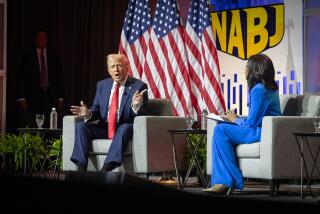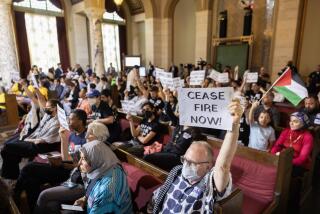Israel a ‘Wicked Hypocrisy’--Farrakhan : Forum Speech Before 14,000 Touches on Foreign Policy, Economics
- Share via
Calling Israel a “wicked hypocrisy” and describing himself as a modern-day Jesus Christ, Muslim leader Louis Farrakhan issued a broad call Saturday night for economic independence for black Americans.
As dozens of protesters marched across the street from the Forum in Inglewood, watched by police, Farrakhan urged blacks to “get control of our own wealth”.
While most of his speech centered on economic issues, Farrakhan repeated some of the anti-Semitic remarks that have divided blacks and Jewish groups and plunged Mayor Tom Bradley into a firestorm of political criticism.
Refers to Holocaust
At one point, he declared that he was not anti-Semitic, saying: “America, you were wrong allowing the Holocaust to take place in Germany.” The crowd of 14,000 rose in a standing ovation.
But, he added later: “Don’t push your six million down our throats when we lost 100 million (to slavery). We weep for Jews but who weeps for us?”
Blacks the Chosen People
Farrakhan, 52, said he had not “come here to Los Angeles to attack Jews.” But, he added: “I am declaring for the world that they are not the chosen people of God. I am declaring for the world that you, the black people, are.
“Why are they (Jews) so excited?” he asked a wildly cheering crowd. “Black men have been coming in and out of Los Angeles for years but never has a black man been feared like Louis Farrakhan. Why are they so upset?”
His strongest remarks concerned America and the state of Israel.
“When President (Franklin D.) Roosevelt knew the Jews were suffering . . . he turned the other way . . . He was Christian.
Says Land Was Stolen
“Now out of guilt, knowing you hate the Jews yourself, that you turned your back while they were suffering . . . to make up for your wickedness you permit the stealing of land from the Palestinian homeland . . . you support the state of Israel with billions of taxpayer dollars.
“Because I have the courage to speak out . . . now I’m an anti-Semite. I have been saying the Jews were to be returned by the Messiah to the Promised Land, not by Ben Gurion (Israel’s first prime minister).
“Why did not you (Israel) wait for the Messiah? It is because of your disbelief in God and your disbelief in the scriptures and your wicked hypocrisy that you would not wait . . . you stole your land.”
The Nation of Islam leader said he was “privileged” to be so controversial. “Jesus appeared . . . and his message was controversial. Moses appeared . . . and his message was controversial. Whenever a man speaks against the popular version of the truth he is considered controversial.”
National Prominence
Farrakhan, who has long been a well-known figure in the black community but rose to wider national prominence last year with his support of presidential candidate Jesse Jackson, was escorted on stage by a half-dozen security guards in dark suits. His first statements were muted by a faulty microphone.
“I’m not surprised,” he said with a smile. “They don’t want you to hear what I have to say.”
Black community leaders met earlier this week with Farrakhan representatives and through them asked the Muslim leader to confine his speech to economic issues. But Farrakhan spokesmen said then no formal agreement had been reached.
Farrakhan has been heatedly criticized in the past for his characterization of Judaism as a “dirty religion” and for a July speech in which he referred to the “wickedness” of Jews.
Bradley Dilemma
Bradley had refused to denounce Farrakhan’s appearance despite heavy pressure by Jewish groups to do so. Instead, Bradley acceded to the requests of black community leaders who urged him to maintain a low profile and allow them to confront Farrakhan.
Farrakhan noted that Bradley had scheduled a Sunday press conference to discuss the controversial minister.
“If you repudiate me tomorrow morning, which you plan to do anyway, I shall be around after your press conference and I shall deal with what you say,” Farrakhan warned.
Farrakhan used most of the speech to rally support for POWER--People Organized and Working for Economic Rebirth--a black economic self-help program he founded in January.
Jobs for Blacks
The project plans to produce household items like toothpaste, deodorants and detergents, at the same time creating jobs for blacks and appealing to the buying power of black consumers. The project was enveloped in controversy when it became known that Libyan leader Moammar Kadafi supplied a $5-million, interest-free loan to POWER.
“You must get up from the foot of your masters and say ‘I am a free man.’ ” he said.
“It is time for black people to come out from under white authority and stop thinking like you are an inferior person.”
Inglewood police kept protesters--members of the militant Jewish Defense League, a cadre of Guardian Angels, seven men dressed in Nazi regalia and assorted religious activists--across Prairie Avenue from the Forum.
Vigil at Bradley’s Home
Several JDL protesters kept an all-night vigil at Bradley’s Hancock Park home Friday, and on Saturday several dozen protested at Forum owner Jerry Buss’ Beverly Hills mansion before appearing at the Forum. After Farrakhan’s speech, they headed back to Bradley’s home.
While Inglewood police patrolled outside the Forum, the security inside was handled by members of Farrakhan’s Muslim sect. Everyone entering the Forum, including reporters, was frisked.
Inglewood Police Sgt. Joseph Reeves said the Muslim security guards were “very well organized. “You’d never see this kind of cooperation for a basketball game,” he said.
The crowd was predominantly black, largely male and ranged from young to middle-age. Several of those arriving for the speech said they were interested in Farrakhan’s economic message.
“He is communicating that we need to pool our resources,” said James Threatt, a 30-year-old salesman. “We are the sixth largest group of people in the world economically. We need to keep our money in house.”
Bradley’s silence on Farrakhan split his black and Jewish supporters and prompted Republicans, including Gov. George Deukmejian, to rebuke Farrakhan and chide the mayor.
Deukmejian, whom Bradley is expected to challenge in the 1986 gubernatorial race, publicly denounced Farrakhan on Wednesday and then on Saturday made Farrakhan the topic of his weekly radio address.
“Because we are a free society, our state and our nation have become unwilling hosts for messengers of hate such as Mr. Farrakhan, the Ku Klux Klan and the American Nazi Party,” the governor said in his radio address.
In another slap at Bradley, Deukmejian added: “It would be a mistake to ignore these outbursts of bigotry. This century’s tragic history of genocide has taught free people a harrowing lesson: silence is liberty’s greatest enemy . . . Public officials and citizens alike have a responsibility to speak out clearly and without hesitation.”
In his speech, Farrakhan issued a slap of his own at Deukmejian. “With your state filled with homosexuals, degenerates, filth and disease, murderous police, with all that, you should welcome me like the return of Jesus,” he said.
The dispute between blacks and Jews over Farrakhan’s visit caught Bradley between two of his biggest political supporters.
Black community leaders, while repudiating the anti-Semitic portions of Farrakhan’s past speeches, support Farrakhan’s economic message and pressured the mayor to reserve criticism. Jewish community leaders, saying that Farrakhan’s anti-Semitic views were well-documented, pushed Bradley to disavow the Muslim leader.
Anticipating protests over Farrakhan’s visit, black community leaders extracted a promise from Bradley more than a week ago to hold off comment until after Farrakhan spoke. Because of that commitment, Bradley canceled a scheduled Saturday news conference and planned to discuss Farrakhan today.
As Bradley’s promise became known, Jewish leaders asked black leaders to release the mayor from his commitment, but black leaders turned them down. Jewish leaders purchased a full-page advertisement in Friday’s Times to criticize Farrakhan, gathering the signatures of 63 religious leaders and public officials. Two black councilmen--Gilbert Lindsay and David Cunningham signed it; a third, Robert Farrell, did not.
Tension between the two groups surfaced again Friday when the Los Angeles City Council considered a resolution condemning Farrakhan for “sowing the seeds of hatred”.
Times staff writers Mark Henry and Steve Bloom contributed to this story.
More to Read
Sign up for Essential California
The most important California stories and recommendations in your inbox every morning.
You may occasionally receive promotional content from the Los Angeles Times.














